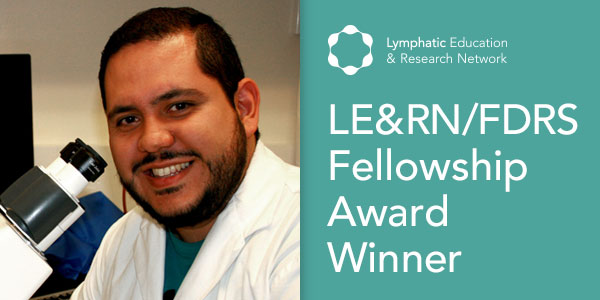Javier Jaldin-Fincati, Ph.D., a Postdoctoral Fellow at the Hospital for Sick Children, Toronto, ON, Canada, under the supervision of Dr. Amira Klip, was awarded with a LE&RN/FDRS Lipedema Postdoctoral Fellowship in December 2015. We asked him to tell LE&RN supporters about his research.
What is the focus of your research?
As part of Dr. Klip’s team, my main research interest is to elucidate how products of adipose tissue metabolism might alter the function of the endothelium. Regarding this research project, we are focused on the study of the communication between adipocytes and lymphatic microvascular endothelial cells, as the preamble to understanding how this communication is affected in diseases such as lipedema. We hypothesize that products of adipocyte metabolism may alter the correct function of lymphatic microvascular endothelial cells, which in turn might affect the draining capacity of lymphatic vessels. As a consequence of this alteration, an inflammatory microenvironment is generated by the accumulation of adipocyte metabolites, recruitment of immune cells and edema. This can create a vicious cycle of lymphatic vessel dysfunction and inflammation with unpredictable consequences for adipose tissue homeostasis.
What do you hope to learn from this research?
Considering that hormones and cytokines are key regulators of adipose tissue metabolism, it is particularly interesting to study how their accumulation in the interstitium, caused by its impaired drainage, would contribute to lymphatic vessels dysfunction. It would be relevant to determine if this dysfunction is produced at the level of the microvascular endothelial cells. In that case, it becomes crucial elucidating the molecular mechanisms underlying these alterations.
What impact do you foresee this research having on our current body of knowledge?
Although undoubtedly this knowledge could lead to better understanding of the onset and progression of lipedema, it would be also relevant for the study of other lymphatic alterations in the context of different metabolic disorders, such as diabetes and obesity.
What clinical implications might grow out of this research?
From the perspective of basic research, it always seems that we are far away from the real clinical impact. However, these kinds of investigations constitutes the essential building block for the development of novel therapies. I hope our findings will contribute to identifying new therapeutic targets for the treatment of lymphatic disorders.
What might the field accomplish within the next few years?
Interest in lymphatic disorders has increased over the last decade as evidenced by the growing number of research groups working in this knowledge field. Nowadays, as a consequence that the lymphatic system is recognized as a key regulator of body homeostasis, the study of its alterations is contributing to better understanding of a broad spectrum of metabolic and immunological disorders. I strongly believe that future investigations in this field will be pivotal to the development of new medical strategies.
LE&RN programs, like the Fellowship Awards program, are only possible because of our Supporting Members. Become a Supporting Member today, for as little as $5/month.

